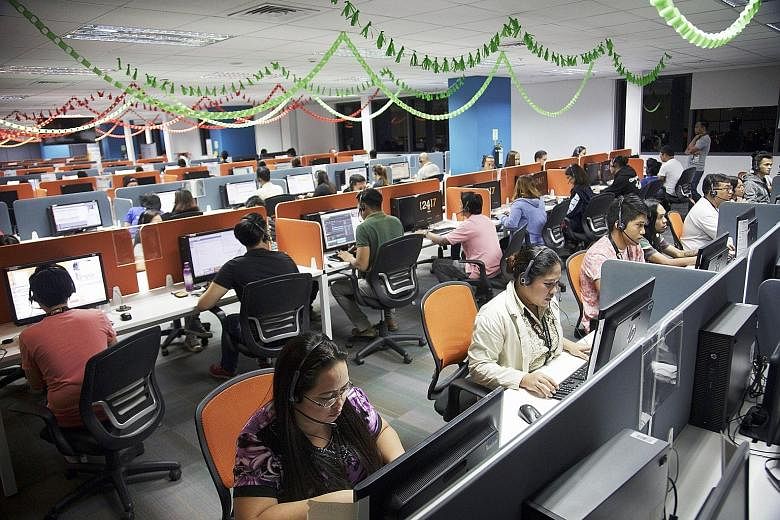These are unsettling times for the Philippines, as this pro-American nation of more than 100 million braces itself for a different kind of America - one that is more assertive and less friendly - under Mr Donald Trump.
If the United States President- elect keeps his campaign pledge to bring jobs back to America, the Philippines' US$22 billion (S$31 billion)-a-year outsourcing industry, a key growth engine, could take a hit.
More than half of call centres here are American-owned, accounting for nearly three-fourths of the outsourcing industry's earnings. They employ more than a million workers in the Philippines. These are the companies Mr Trump wants to punish for outsourcing jobs to places like the Philippines.
He has also vowed to deport at least three million illegal immigrants, including some 300,000 undocumented Filipinos.
Restrictions on immigrants, meanwhile, could cut into US$10 billion worth of yearly remittances from over 3.4 million Filipinos who are already American citizens, and make it more difficult for them to bring more of their kin to the US.
Mr Trump has said he plans to tax remittances and put further caps on how much immigrants can remit to countries he considers as terrorist havens, including the Philippines.
Filipinos in the United States are also concerned that Mr Trump's "America first" policy could deprive them of job opportunities.
His promise to raise tariffs could cost the Philippines tax discounts under a system called the generalised system of preferences. It exported US$1.4 billion worth of goods to the US under this scheme last year.
Much now hinges on the Philippines' pragmatic, but unpredictable, President, Mr Rodrigo Duterte. The hope is that he and Mr Trump, both of whom rose to power with populist policies tapping voters' frustration with established political parties, will get along.
Mr Duterte has so far been cordial, even suggesting he may have found a kindred spirit in Mr Trump.
"We are both foul-mouthed," he said. They also share a fondness for Russian President Vladimir Putin.
In congratulating Mr Trump, he declared: "Mabuhay ka! (Long live!)" In stark contrast, he had called US President Barack Obama a "son of a whore".
Asked on Tuesday if he thinks he can hit it off with Mr Trump, he replied: "Yes, I'm sure. We don't have any quarrel." He said he does not expect Mr Trump, unlike Mr Obama, to call him out over his human rights records. More than 2,300 people have been killed either in police operations or by masked vigilantes since Mr Duterte took office and began a violent and controversial anti-crime drive.
Mr Duterte has gone back on his threats to end war games with the US, send American troops packing and scrap a 10-year defence pact with Washington.
For good measure, he has sent as his special envoy to Washington Mr Jose Antonio, a business partner of Mr Trump whose company Century Properties Group built the Trump Tower Manila.
"Duterte is intelligently leveraging Trump's business ties," said political analyst Richard Javad Heydarian of De La Salle University.
But if things go awry with Mr Trump, Mr Duterte already has an insurance policy: China. As his hostility towards the Obama administration escalated, Mr Duterte reached out to China.
He secured US$24 billion in investment pledges during his four-day state visit to China last month. Trade between China and the Philippines is already worth some US$17.6 billion a year. Only Japan is a larger trading partner.
More than US$600 million in foreign direct investments are expected from China annually, just in case inflows from the US - estimated at US$450 million a year - dry up.
Mr Ernesto Pernia, the government's chief economic planner, said Mr Duterte's "pivot" to China was "a saving grace".
"We're now diversifying our friendship so that we don't crash when the country we depend on is in trouble," he said.
Mr Duterte does not expect Mr Trump to be as brash as he was when he was campaigning. He said he expects Mr Trump, for instance, to be "fair in the matter of the treatment of illegal immigrants".
Mr Duterte sees Mr Trump as a "businessman, a pragmatic person", and someone he can work with, "as opposed to the Democrats, including Mr Obama, who are much more perhaps idealistic and more focused on issues such as human rights and democracy", said Mr Heydarian.

